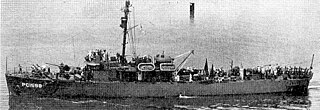
USS Hogan (DD-178/DMS-6) was a Wickes-class destroyer in the United States Navy during World War II.

USS Howard (DD–179), (DMS-7) was a Wickes-class destroyer in the United States Navy during World War II. She was named for Charles W. Howard, who was killed in the American Civil War aboard USS New Ironsides.

USS Doneff (DE-49) was an Evarts-class destroyer escort which served in the United States Navy in the Pacific Theater of Operations. The only encounter with the Imperial Japanese Navy was the sighting of one or two A6M Zero fighters during the operational time spent in the Aleutian Islands.

USS Acree (DE-167) was a Cannon-class destroyer escort in service the United States Navy from 1943 to 1946. She was scrapped in 1973.

USS Spangler (DE-696) was a Buckley-class destroyer escort of the United States Navy.

USS George (DE-697) was a Buckley-class destroyer escort. She was the second ship of the United States Navy named after Seaman Second Class Eugene F. George (1925–1942), who was posthumously awarded the Navy Cross for his heroism on USS San Francisco at the Naval Battle of Guadalcanal.
USS Motive (AM-102) was an Auk-class minesweeper built for the United States Navy during World War II. She earned three battle stars for World War II service. She was decommissioned in 1946 and placed in reserve where she remained until struck from the Naval Vessel Register in December 1966. She was sunk as a target in April 1968.

USS Gilmore (DE-18) was an Evarts-class short-hull destroyer escort in the service of the United States Navy.

USS Excel (AM-94) was an Adroit-class minesweeper of the United States Navy. Laid down on 19 December 1941 by the Jakobson Shipyard, Inc., Oyster Bay, Long Island, New York, launched on 10 May 1942, and commissioned on 11 December 1942. The ship was reclassified as a submarine chaser, PC-1598 on 1 June 1944.

USS Harold C. Thomas (DE-21) was an Evarts-class destroyer escort constructed for the United States Navy during World War II. It was promptly sent off into the Pacific Ocean to protect convoys and other ships from Japanese submarines and fighter aircraft. At the end of the war, she returned to the United States with two battle stars.

USS Charles R. Greer (DE-23) was an Evarts-class destroyer escort constructed for the United States Navy during World War II. She was promptly sent off into the Pacific Ocean to protect convoys and other ships from Japanese submarines and fighter aircraft. At the end of the war, she returned to the United States with two battle stars.
The second USS Dempsey (DE-26) was an Evarts-class destroyer escort constructed for the United States Navy during World War II. She was promptly sent off into the Pacific Ocean to protect convoys and other ships from Japanese submarines and fighter aircraft. By the end of the ship's World War II service career, when she returned to the United States, she had accumulated three battle stars.

USS Stadtfeld (DE-29) was an Evarts-class destroyer escort constructed for the United States Navy during World War II. It was promptly sent off into the Pacific Ocean to protect convoys and other ships from Japanese submarines and fighter aircraft. By the end of the war, when she returned to the United States, she was awarded four battle stars.

USS Martin (DE-30) was an Evarts-class destroyer escort constructed for the United States Navy during World War II. The ship was promptly sent off into the Pacific Ocean to protect convoys and other ships from Japanese submarines and fighter aircraft. The vessel entered service in 1943 and spent its entire career in the Pacific Ocean. Following the surrender of Japan, Martin returned to the United States and by the end of 1945, was slated for scrapping, which began in 1946.

USS Engstrom (DE-50) was an Evarts class destroyer escort constructed for the United States Navy during World War II. She was sent off into the Pacific Ocean to protect convoys and other ships from Japanese submarines and fighter aircraft. She performed escort and antisubmarine operations in dangerous battle areas and returned home safely to the States.

USS Dionne (DE-261) was an Evarts-class destroyer escort of the United States Navy during World War II. She was sent off into the Pacific Ocean to protect convoys and other ships from Japanese submarines and fighter aircraft. She performed escort and antisubmarine operations in dangerous battle areas and returned home with six battle stars, a high number for a ship of her type.

USS Canfield (DE-262) was an Evarts-class destroyer escort constructed for the United States Navy during World War II. She was sent off into the Pacific Ocean to protect convoys and other ships from Japanese submarines and fighter aircraft. She performed escort and antisubmarine operations in dangerous battle areas and returned home with four battle stars.

USS Cloues (DE-265) was an Evarts-class destroyer escort of the United States Navy during World War II. She was sent off into the Pacific Ocean to protect convoys and other ships from Japanese submarines and fighter aircraft. She performed escort and antisubmarine operations in dangerous battle areas and returned home with three battle stars.

USS McConnell (DE-163) was a Cannon-class destroyer escort built for the United States Navy during World War II. She served in the Pacific Ocean and provided escort service against submarine and air attack for Navy vessels and convoys. She was awarded three battle stars.

USS McCoy Reynolds (DE-440) was a John C. Butler-class destroyer escort acquired by the U.S. Navy during World War II. The primary purpose of the destroyer escort was to escort and protect ships in convoy, in addition to other tasks as assigned, such as patrol or radar picket. Post-war, after operating in the Pacific Ocean battle areas, her crew members returned home with four battle stars to their credit for World War II and one for the Korean War.


















